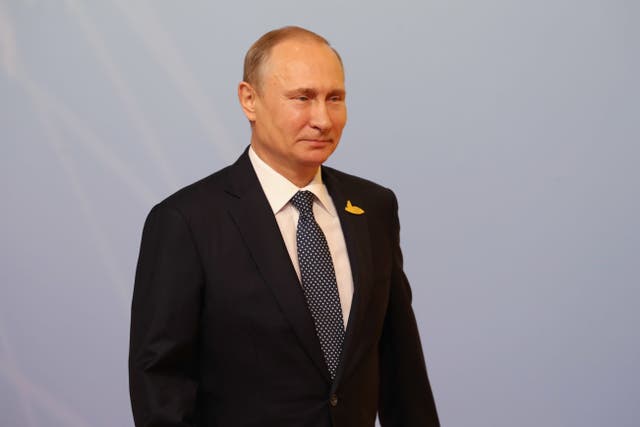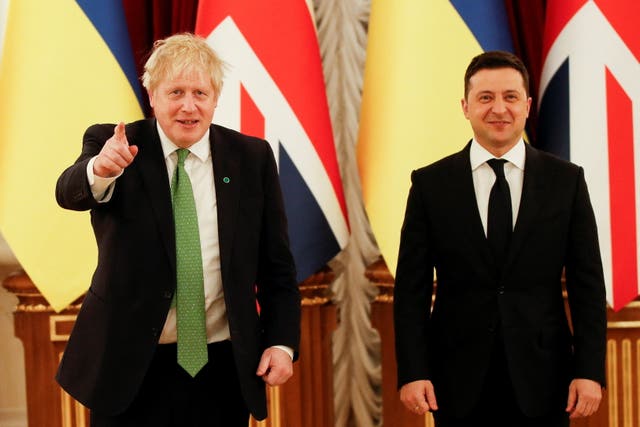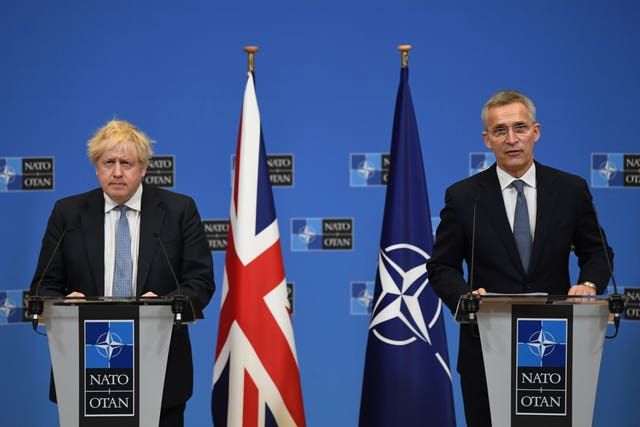
Prime Minister Boris Johnson is leading last-ditch diplomatic efforts to bring Russian President Vladimir Putin “back from the brink” of war in Ukraine.
Ministers and senior officials are to consider the response to Vladimir Putin’s actions in Ukraine.
The Government is preparing to slap sanctions on key Russian figures and businesses after President Putin recognised two breakaway regions of eastern Ukraine as independent states.
At the 0630 meeting of the Cobra committee the Prime Minister will be briefed on the latest intelligence after Mr Putin ordered his troops to carry out “peacekeeping” duty in the Donetsk and Luhansk regions.
The Cobra meeting follows an emergency session of the UN Security Council, where the UK’s ambassador Dame Barbara Woodward said Russia has “brought us to the brink”, warning that the country’s actions “will have severe and far-reaching consequences”.

Boris Johnson's to 'explore' sending further support to Ukraine
Mr Johnson said the decision from Mr Putin to recognise Donetsk and Luhansk was an “ill omen” and a flagrant breach of international law.
The Cobra meeting will co-ordinate the UK response and agree a “significant package of sanctions to be introduced immediately”, No 10 said.
On Monday night Mr Johnson outlined his “grave concern at recent developments in the region” in a call with the Ukrainian president and said he would consider further “defensive support”.
“Prime Minister Boris Johnson spoke to Ukrainian President Volodymyr Zelensky this evening to discuss the deteriorating situation in and around Ukraine,” they said.
“Outlining his grave concern at recent developments in the region, the Prime Minister told President Zelensky that he believed an invasion was a real possibility in the coming hours and days.”
Downing Street also said Mr Johnson told President Zelensky that he would “explore sending further defensive support to Ukraine” at the request of the country’s government.
What is the cause of tension in Russia and Ukraine?
The current difficulties date back to the overthrow in 2014 of the pro-Moscow Ukrainian government of Viktor Yanukovych, prompting fears in the Kremlin that the country was moving into the orbit of the West.
President Vladimir Putin responded by sending in troops to annex Crimea while Russian-backed separatist rebels seized territory in eastern Ukraine in bloody fighting with the Ukrainian military.
 Russian President Vladimir Putin wants Nato to draw back forces from eastern Europe (Matt Cardy/PA)
Russian President Vladimir Putin wants Nato to draw back forces from eastern Europe (Matt Cardy/PA)
Why is the West so concerned now?
For months, the US and other Nato allies have been warning of a massive Russian military build-up on the Ukrainian border, triggering fears that it is preparing another incursion against its southern neighbour.
Latest estimates suggest Moscow has 130,000 troops massed in the border region and in neighbouring Belarus, close to the strength some analysts believe would be needed to mount a full-scale invasion.
Russian and Belarus forces are embarking on large-scale military exercises which, some believe, could provide cover for an attack.
Will the West intervene militarily if Russia does attack?
The UK’s ambassador to the UN has urged Russia to “step back” from invading Ukraine as the Prime Minister prepared to chair a Cobra meeting on Tuesday morning to discuss the latest developments.
Dame Barbara Woodward told an emergency meeting of the UN Security Council that Russia has “brought us to the brink”, warning that the country’s actions “will have severe and far-reaching consequences”.
The Cobra meeting, which is scheduled to take place at 6.30am, will be used to “coordinate the UK response”, including agreeing a “significant package of sanctions to be introduced immediately”, according to a Downing Street spokesperson.
Boris Johnson told Ukrainian president Volodymyr Zelenskyy that he believes a Russian invasion is “a real possibility in the coming hours and days”, No 10 said.
 Boris Johnson in Kyiv last week for crisis talks with Ukrainian President Volodymyr Zelensky (Peter Nicholls/PA)
Boris Johnson in Kyiv last week for crisis talks with Ukrainian President Volodymyr Zelensky (Peter Nicholls/PA)
How has Moscow responded?
Mr Putin has repeatedly insisted that Russia has no intention of carrying out an invasion.
He has however issued a series of demands intended to curb the influence of the West in eastern Europe, in what Moscow traditionally regards as its sphere of influence.
They include calls for guarantees Nato will not admit any new members – including Ukraine – and the drawback of alliance forces in the region.
 Boris Johnson during a meeting with Nato secretary general Jens Stoltenberg (Daniel Leal/PA)
Boris Johnson during a meeting with Nato secretary general Jens Stoltenberg (Daniel Leal/PA)
What is the reaction to that in the West?
Nato has been adamant it will not accept limits on the nations that it admits to the alliance.
Boris Johnson has however said there is “a conversation to be had” about force dispositions in eastern Europe.
More controversially, French President Emmanuel Macron, who held talks with Mr Putin in Moscow, has raised the idea of the “Finlandisation” of Ukraine, with Kyiv becoming neutral in the way Finland was during the Cold War.
What is the advice to British citizens in Ukraine?
On Friday night, the Foreign Office said all British nationals in Ukraine should “leave now while commercial means are still available”.
British ambassador to Ukraine Melinda Simmons was remaining with a “core team” in Kyiv, but some embassy staff and their families were being withdrawn.
But UK nationals were warned by armed forces minister James Heappey that the RAF would not carry out Kabul-style airlifts for any citizens who do not leave before fighting begins.
The White House has also urged US citizens to flee Ukraine, as have Nato allies Canada, Norway and Denmark, as well as non-alliance ally New Zealand.
Will Russia and Ukraine go to war?
With an estimated 130,000 troops on Ukraine’s borders, some analysts believe the Russian build-up has gone too far for there not to be some kind of military incursion.
Ultimately, however, it comes down to President Putin and what he calculates are the potential risks and benefits as the West struggles to put on a united front.



Why are you making commenting on The Herald only available to subscribers?
It should have been a safe space for informed debate, somewhere for readers to discuss issues around the biggest stories of the day, but all too often the below the line comments on most websites have become bogged down by off-topic discussions and abuse.
heraldscotland.com is tackling this problem by allowing only subscribers to comment.
We are doing this to improve the experience for our loyal readers and we believe it will reduce the ability of trolls and troublemakers, who occasionally find their way onto our site, to abuse our journalists and readers. We also hope it will help the comments section fulfil its promise as a part of Scotland's conversation with itself.
We are lucky at The Herald. We are read by an informed, educated readership who can add their knowledge and insights to our stories.
That is invaluable.
We are making the subscriber-only change to support our valued readers, who tell us they don't want the site cluttered up with irrelevant comments, untruths and abuse.
In the past, the journalist’s job was to collect and distribute information to the audience. Technology means that readers can shape a discussion. We look forward to hearing from you on heraldscotland.com
Comments & Moderation
Readers’ comments: You are personally liable for the content of any comments you upload to this website, so please act responsibly. We do not pre-moderate or monitor readers’ comments appearing on our websites, but we do post-moderate in response to complaints we receive or otherwise when a potential problem comes to our attention. You can make a complaint by using the ‘report this post’ link . We may then apply our discretion under the user terms to amend or delete comments.
Post moderation is undertaken full-time 9am-6pm on weekdays, and on a part-time basis outwith those hours.
Read the rules hereLast Updated:
Report this comment Cancel